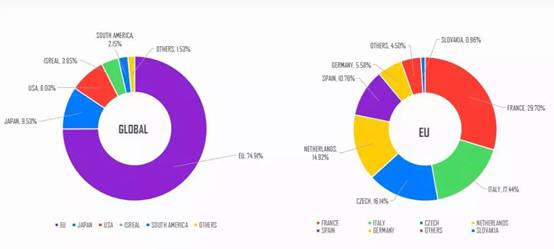Firm building $37m salmon plant revives hope in China seafood processing hub
BRUSSELS, Belgium -- Chinese seafood firm Dalian Rich Enterprise Group has started work on a new CNY 250 million ($36.6m) processing plant in Dalian, Liaoning province, providing a welcome boost to the Chinese seafood processing hub.
Dalian Rich, a large processor of Pacific salmon, began foundation work last summer on the plant, which will produce 16,000 metric tons of finished salmon, cod and shrimp products a year.
The plant will do mainly farmed Atlantic salmon and wild Pacific salmon, Deng En Tang, CEO of Dalian Rich, told Undercurrent News in an interview during the 2019 Seafood Expo Global in Brussels, Belgium. Dalian Rich will also work with Japanese companies to process salmon by-products into snacks, he said, while it is in talks with a "major Japanese seafood firm" to build an R&D center for new products.
Piling of foundations for the plant began last summer with construction work beginning on Feb. 26. The plant's 35,000t cold storage facility is set to be operational before the year's end and the plant will start full operations by February 2020.
Deng said the firm has been in talks with Icelandic equipment manufacturer Marel to install a smoking line.
Founded in 1994 and one of China’s largest Pacific salmon processors, Dalian Rich can draw on significant experience but its investment is owed to the adoption of a different strategy compared with other Dalian-based seafood processors. It has a joint venture with Danish seafood trading firm Seafood Sales, and sells its seafood brand N'Joy Seafood in European markets.
“Many factories in Dalian are in a downturn," said Deng. "We thought long and hard about why that is and determined they are mainly reliant on contract processing for foreign companies, and they haven’t developed strong industrial chains, nor do they have their own brands. They are just factories."
"Since China's reform and opening up, China's production costs have been very competitive, but that is no longer strictly the case and yet factories are still participating in the international market in this way."
In contrast, in 2018, 48% of Dalian Rich's CNY 933m in annual revenues were from domestic sales, according to a presentation by the firm. Its Chinese seafood brands are “very popular” in China’s northeast, north and northwest, said Deng.
Deng said with the new plant, which it expects to sell half of products to the domestic market, revenues at the firm could hit CNY 1.5 billion.
Moreover, aside from primary processing of fillets, portions, blocks, the plant will also do deeper processing of value-added products such as smoked, breaded, flavored, ' stuff-in' and ready-to-eat/cooked items, according to the firm. It will also produce Asian style finished products including gyoza, sushi toppings and dim sum.
It will be split into two floors with a total floor area of 10,000 square meters situated on a 50,000 sq. meter site. Situated on the ground floor will be a "Salmon Story” experience museum for visitors and green spaces.

Deng said half the capital investment would come from the firm itself with banks providing the remaining financing.
"China's market is rapidly developing up the value chain. From basic processing of raw material to food ingredients and food products to health products and medicine, greater value can be seen in all segments. We are also using 'smart logistics', improved temperature regulation of the cold chain and mechanized and intelligent production equipment. We have also added consumer interactions and consumer experiences," said Deng.
Deng said the firm aims to become China's largest salmon company and at the Seafood Expo Global, Deng's colleagues were in discussions with "world-famous salmon companies" about partnerships to develop the Chinese market, he said.
He added the plant shows Dalian is still an attractive place for seafood companies, despite the US-China trade war, a tightening credit market and problems at neighboring firms. According to Dalian Rich, the plant's location in Jinzhou district, a local seafood industry cluster, provides access to logistics services and a nearby port.

